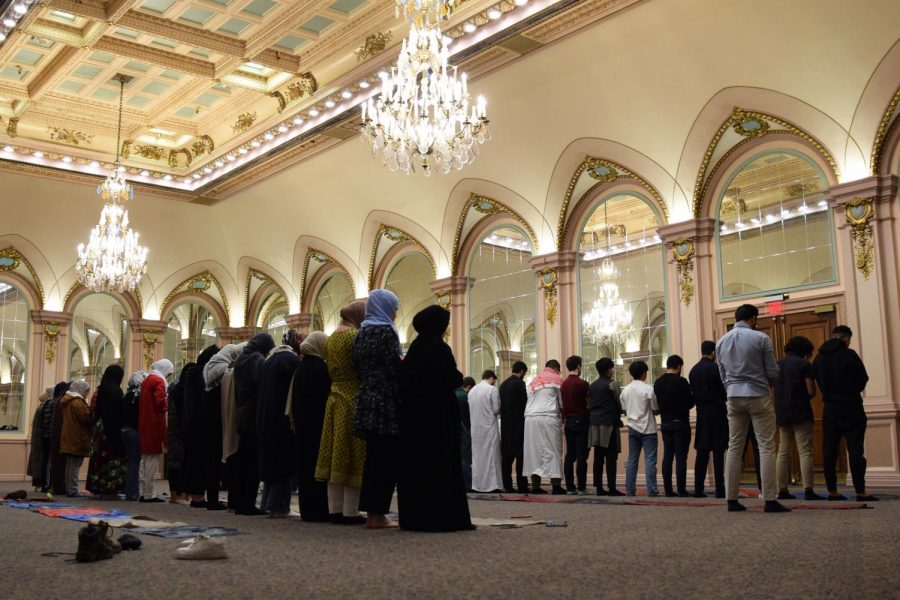Pitt students celebrate Passover, Ramadan and Easter with their religious communities on campus
Pitt students pray Maghrib, the evening prayer, during the Muslim Student Association’s iftar in the William Pitt Union in April 2022.
April 13, 2023
Students on campus celebrated a wide range of religious holidays last week, and they are balancing the observances with their usual course loads and the regular stressors of college life.
Despite having classes during the month of Ramadan, Muhammad Rajput said he hasn’t “observed a dip” in his academics. Rajput, a junior biology major, said although taking exams and completing classwork is “harder” while fasting for Ramadan, it isn’t “impossible.”
“It does get a little harder to study due to the fact that there is more emphasis on religious activities, which leaves less time for studying, doing homework, or paying attention in class,” Rajput said. “It makes it a little more hectic then also for taking exams, especially without fluids.”
Ramadan coincides this year with two other major holidays in Judaism and Christianity, Passover and Easter.
Since Pitt doesn’t have any religious holidays included as days off in the academic calendar, students observe Passover, Ramadan and Easter within their religious communities at Pitt.
When asked why Pitt does not give any days off for religious holidays, University spokesperson Nick France said students and others in the Pitt community can receive “accommodations.”
“At Pitt, we make an effort to be as inclusive as possible,” France said. “Therefore, the University has a very commonsense policy, as outlined in the faculty handbook, where we each make reasonable accommodations for our colleagues and students who need time off for religious holidays.”
Carli Starman, a junior nursing major who practices Judaism, said she didn’t go home to Ann Arbor, Michigan, during Passover this year.
“I have always wanted to go home for Passover, but it just happens to be very inconvenient every year,” Starman said. “Passover is my favorite holiday, and it does make me miss my family, so I would go home if I felt like it made sense. But I have just had to prioritize school the last two years, and going home during freshman year just wasn’t really an option with COVID.”
According to the Office for Equity, Diversity and Inclusion’s website, students may request absence from class because of religious observance.
Ann Cudd’s Memo on Religious Observances and Student Well-Being during the Academic Year says students “should not be penalized for absences” if their religious observances conflict with University activities. This memo also states faculty should “encourage students to raise the potential for such concerns as early in the term as possible,” and faculty and students should “make a reasonable effort to reach mutually agreeable arrangements.”
Passover, which lasts from the evening of April 5 to the evening of April 13 this year, is a major Jewish holiday that celebrates the escape of the Isrealites from slavery in Egypt.
Starman said she went to the Pitt Hillel and Chabad seder and visited a friend’s family for a seder. The seder, held on the first and sometimes second night of Passover, is a meal where observers gather to eat special foods such as a lamb shank bone and bitter herbs, read certain prayers and readings and participate in other Passover traditions.
“I went to the Pitt Hillel and Chabad seder, which was fun because there were so many people celebrating together,” Starman said. “I also went home with my friend for a night and had a seder with her family which was really fun, even though it did make me a bit more homesick.”
Ramadan, which lasts from the evening of March 22 to the evening of April 20 this year, is the holiest month in the Islamic calendar. According to Rajput, Muslims observe this month by fasting from dawn to dusk.
Rajput, outreach chair for the Muslim Student Association, said he’s observed Ramadan more “socially” this year than in the past. He said he often breaks his fast with friends at restaurants, with MSA at their iftars or sometimes even with family if he is able.
“I have observed prayers much more socially as a result of being on campus, praying with other Muslims, which is also encouraged in our religion,” Rajput said.
Easter, celebrated on April 9 this year, is a major Christian holiday which celebrates the resurrection of Jesus Christ.
Regan Quigley, a sophomore nursing major and secretary of the Catholic Newman Club, said she didn’t go home for Easter because there are no days off of classes. Quigley said she celebrates Easter while at school by attending “beautiful” services, events and masses at the Newman Center and St. Paul’s Cathedral.
According to Quigley, she celebrated every day of the Easter Triduum, the summit of the Catholic Liturgical Year and “the holiest weekend of the year,” with other members of the Catholic Newman Club.
Quigley said she attended the Mass of the Lord’s Supper to celebrate Holy Thursday at the Newman Center Oratory and participated in a walking tour of seven different churches in Pittsburgh along with other members of the Catholic Newman Club, as well as the Stations of the Cross on Good Friday and Easter Vigil Mass on Saturday.
According to Rajput, the biggest challenge of Ramadan is not the fasting or the difficulty to find time to study amid religious activities. To him, the hardest part of Ramadan is “always trying to be the best version of yourself throughout the month.”
“You work on every aspect of you as a human to try and get better, which puts you out of your comfort zone,” Rajput said. “At the end, you are always glad you did give it that effort, but during it can become a little stressful.”








